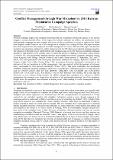| dc.description.abstract | Political campaigns employ war metaphors that bring forth the resemblance between the rigours of war and the
struggle to occupy electoral offices. In this regard, the political candidates are soldiers, the constituents are the
battle grounds, campaigns are war strategies and victory or loss in an election is victory or defeat in war. While
most linguistic studies focus on use of war metaphors as strategies for winning elections, this paper examines
how such metaphors have been employed in conflict management in election. The aim of the paper was therefore,
to analyze war metaphors employed in conflict management in the 2013 Kenyan presidential campaign speeches.
The objective of the paper was to establish if the war metaphors used in the 2013 Kenyan presidential campaign
speeches to urge people to avert violence were relevant to the people of Tarakwa, Uasin Gishu County, Kenya.
To achieve this, four presidential campaign speeches from sampled presidential campaign candidates namely
Uhuru Kenyatta, Raila Odinga, Musalia Mudavadi and Martha Karua between 1st September, 2012 and 2nd
March, 2013 were presented to four focus group discussions, conducted in Chagaiya, Kipkurere, Tarakwa and
Languise within Uasin Gishu County, Kenya. The focus group discussion participants commented on the
relevance of the war metaphors in conflict management. Data was analyzed within the precincts of relevance
theory propounded by Dan Sperber and Deirdre Wilson (1995). This paper established that presidential
candidates employed conceptual metaphors which drew a resemblance relationship between war and elections
such as CONSTITUENTS ARE BATTLE FRONTS, CHILDREN ARE SOLDIERS and CONCEDING
DEFEAT IS TO ACCEPT ELECTION RESULTS to not only dissociate with violence, but to also urge the
electorates to avert violence during elections. In addition, though these metaphors were relevant in conflict
management, the electorate were skeptical on the motives of the presidential candidates’ use of the metaphors.
Despite these, the metaphors were important in shaping voters’ understanding of conflict management through
dissociation with war. | en_US |

